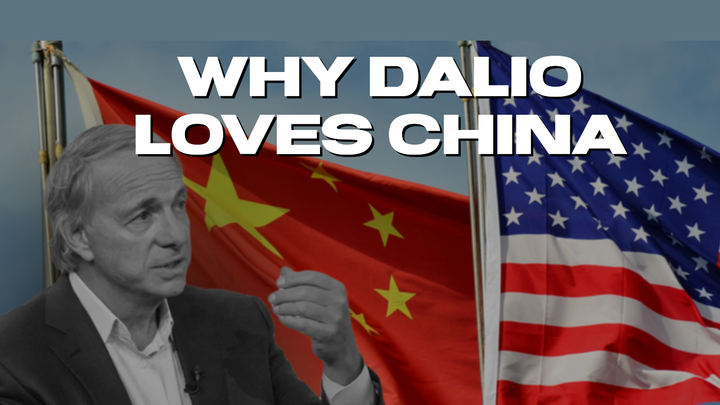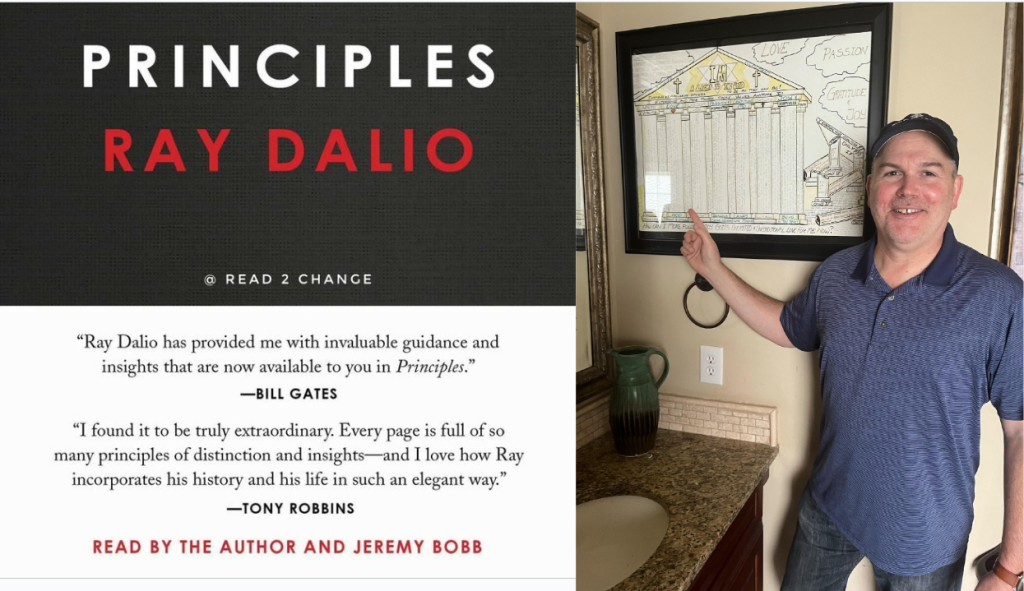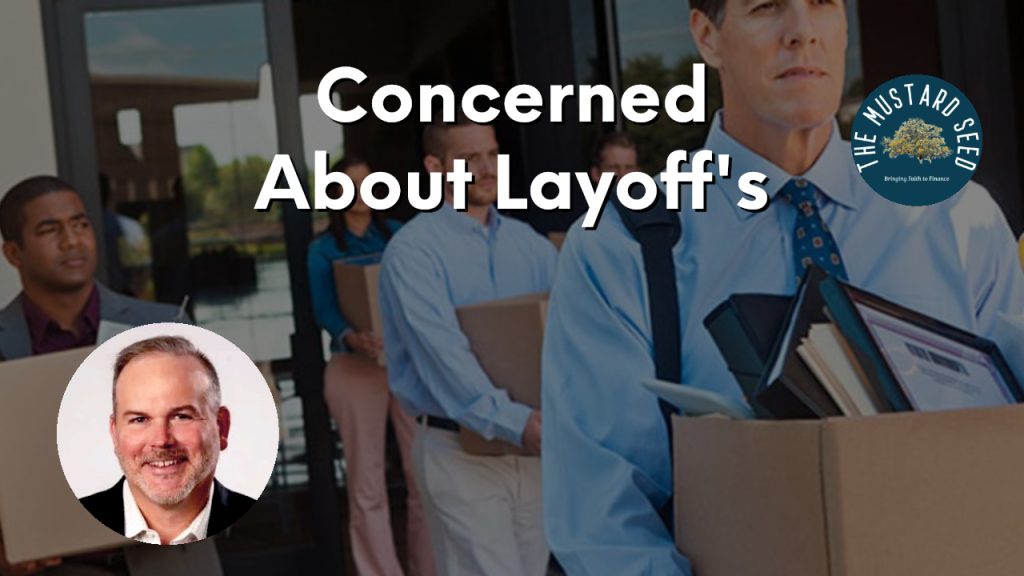Last month many of us in Chattanooga experienced the worst of it as we were all hunkered down “safely” at home, keeping our distance from others who could possibly pass on the sickness that has infected the entire planet. Our family has found ways to enjoy the time together, playing games, working outside and taking long walks and bicycle rides together.
Easter Sunday we staged an Egg hunt for our kids, watched streaming services from the comfort of our home and enjoyed a nice meal. Little did we know that the second wave of calamities was about to hit.
I was in the basement watching a movie and had fallen asleep when Jennifer and the kids all came running downstairs because the storm winds were blowing and I was already in the safest place in the house. A few minutes later, Sydney (our oldest daughter) exclaims, “There’s water coming in”. For the next thirty minutes we were busy trying to save electronic devices, books, papers and anything else that could be damaged by the flood waters. Our sump pump could not work fast enough, and things did not smell pretty. Before too long we were ankle deep in septic water and watching the tide rise. It seems the culvert beside the house that drains to the river was overflowing into our yard.
And then the storm passed, the waters receded just as quickly as they had risen. It was like watching the tide go out in a matter of minutes rather than hours. But the smell remained.
We were lucky to live in an area that was only marginally affected by the storms. We replaced our carpet last week. We count our blessings because others have lost entire homes, vehicles, furniture and are still living in hotels. Doing what we can to help through Samaritans Purse allows us to further feel the gratitude knowing that we were spared and feelings of abundance that we want our children to learn from.
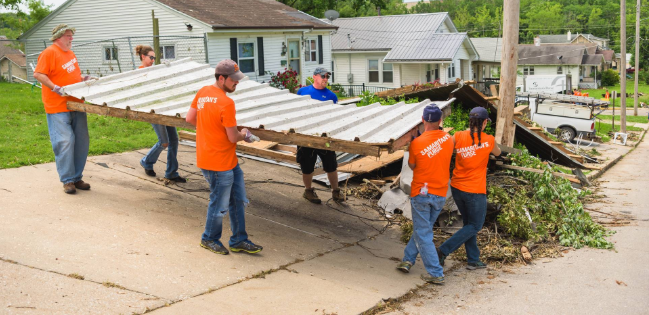
A Story of Contrasts
An old woman is nearing the end of her life. As she closes her eyes one night, she sees a bright light and is transported to another realm. She doesn’t pass away just then, instead, she returns to the living world to find her family gathered at her bedside. She smiles and whispers to her children, “I have seen the great hereafter.”
“The great whereafter?” Her son asks.
“Heaven and hell. I have seen them both.” (the shades in between)
She had found herself in a hallway where an angel showed her two doors and told her she could enter whichever room she wished. The old lady tried the first door and entered the room. In the middle of the room, was a large round table with a large pot of stew. It smelled delicious and made the lady’s mouth water, but the people sitting around the table were thin and sickly. They appeared to be famished. They were holding spoons with very long handles and each found it possible to reach into the pot of stew and take a spoonful, but
because the handle was longer than their arms, they could not get the spoons back into their mouths. The lady shuddered at the sight of their misery and suffering.
The angel said, “We have seen Hell.”
Behind the second door, the room appeared exactly the same. There was the large round table with the large pot of wonderful stew that made the lady’s mouth water. The people had the same long-handled spoons, but they were well nourished and plump, laughing and talking. The lady said, “I don’t understand.”
The angel smiled. It is simple, he said, Love only requires one skill. These people learned early on to share and feed one another. While the greedy only think of themselves…
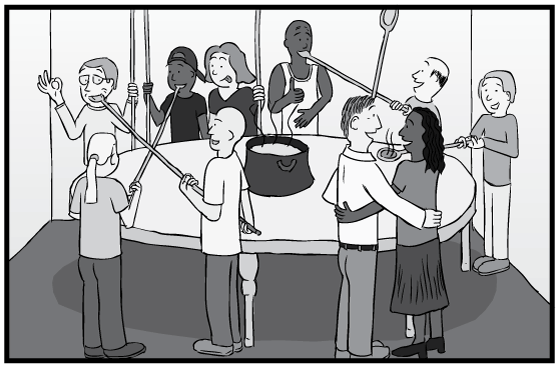
“I suddenly understood the difference between heaven and hell,” the old woman said to her family. “It is neither the qualities of the place, nor of the abundance of resources, but the way people treat each other. “In hell, we are selfish. We would rather go hungry than give the people we don’t care for the pleasure of eating.” “But in heaven, we feed each other. We put trust in those around us, and never go hungry.”
Sometimes, thinking solely of our personal gratification, we tend to forget our interdependence with everyone and everything around us, so much so that we stop caring about them. But, as this parable makes it clear, by doing so, not only don’t we help others overcome their suffering, but we’re also unconsciously harming ourselves, since we are all connected on a very deep level. By giving to others, we not only recognize the abundance that we have all around us but we bless others who may have a be going through even rougher periods. One way we can work to create an abundant life is by giving to others. This is one of the most powerful principles of all time. By sharing with the world, our actions show that we believe in advancing others and that there’s more than enough wealth and abundance to go around for everyone. And since like attracts like, if we give freely with the world, the law of reciprocity creates a world that shares back with us.
It’s Not Just About the Money
When we think about giving, we may think of only giving money. However, there are many things we can give to add value.
We can:
– Send thoughts of kindness, compassion, and goodwill to people who need it
– Smile at everyone we see
– Give away physical items we no longer need
– Volunteer our time for those in need
– Give away one of our gifts or talents, such as painting or singing, and make someone’s day
– Offer a free service to provide for others
– Provide a meal or cup of coffee to a friend or stranger
Each of those things will bring rewards to we and the recipients of our kindness.
However, we might be surprised to learn that, when we give money, ultimately we may reap the best rewards.

Is This Our Mindset?
If we study the principles of wealth, we’ll likely keep coming across the idea that it’s important and powerful to give money to others.
Still, we might sometimes find ourselves making excuses like this:
“I will give when I reach my financial goals. Then I’ll be able to afford it.”
That’s a scarcity mindset that tells creates a negative feed-back loop where:
There’s not enough.
I might need this for an emergency.
I feel safer holding on to this.
So, we ultimately end up getting what we expect where:
We never make or get enough money.
Unexpected expenses keep coming up and draining our account.
Larger sums of money don’t come to us because we don’t allow money to flow through us.
I’m guessing none of this is what we want. So, what can we do about it?
It’s this simple:
Want to receive more? Then give more.
If we want more money, don’t hoard it-circulate it. We must be a conduit for money to flow through, not a stopping point. And when we do give money to others, lovingly give a generous amount, without expectations of getting something in return. Recently, we’ve paid off our building and we now have extra funds that we did not have previously. So we give back by donating this extra to our Church and other charitable causes that help others. And we help provide a teaching moment for our children in the process.
No matter how little or how many resources we have, we should think about how we can give some of it away and live with an attitude of abundance.
Giving is a Wealth Habit
Like all wealth-building habits, we must practice giving before we become wealthy, not once we are there.
If we think we will suddenly find giving a percentage of what we make easier when we are making a lot more money, we are mistaken. We must start with whatever we have now.
So we give freely and know in our hearts that making other people’s lives better or easier is payment enough. This is how we send a “prosperity” mindset to those around us. And it creates a cycle that grows on itself to the point that wealth and abundance become our reality. We learn to share and work together rather than competing for “scarce” resources. When we learn that there is “plenty” for everyone, we create a better world.
Or Start by Doing This…
If regularly giving money is a new or uncomfortable idea, many of us can still give of our time and talents. As we prepare for a new era, this is a great time to start developing a new mindset where we give generously and consistently make others feel better. Give them a warm smile, a loving thought… or any of the other things mentioned earlier.
As we practice giving away small things, we attract back to ourselves the confidence to share even more. When we offer our prosperity to the world, the world responds favorably.
Below is an infographic on Abundance vs Scarcity from The Art of Living author, Bob Proctor.
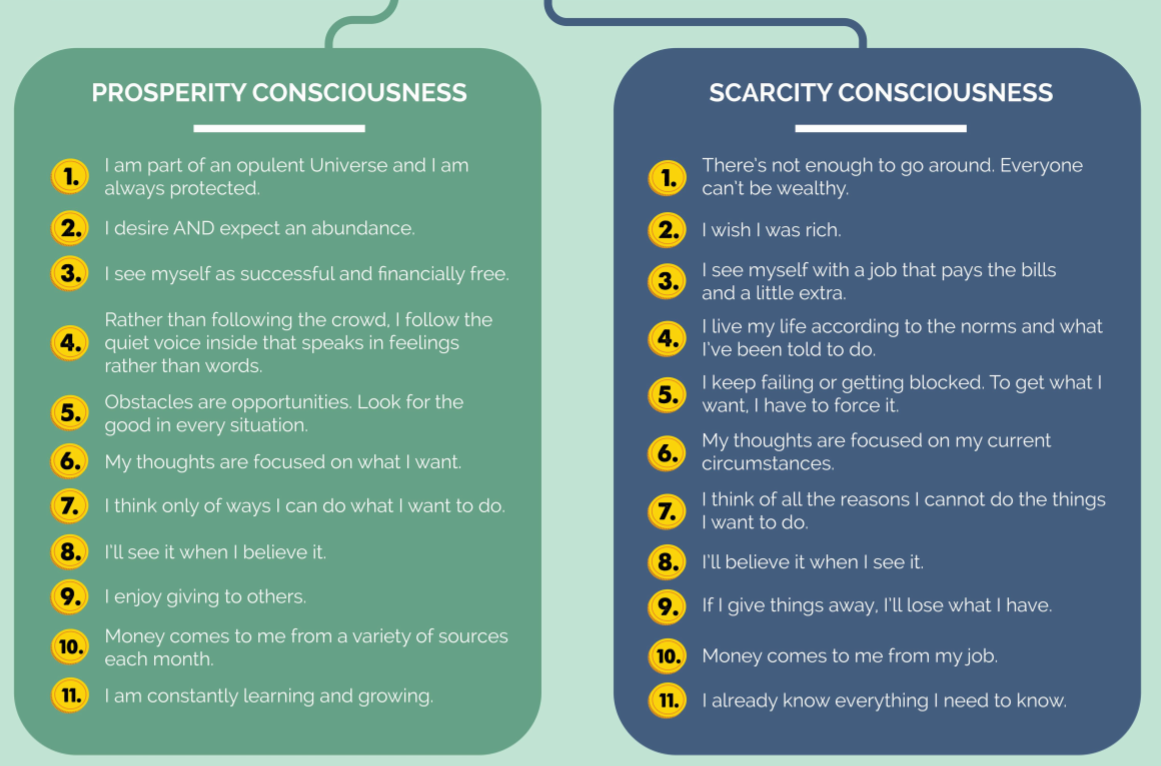
Joe D. Franklin, CFP is Founder and President of Franklin Wealth Management, and CEO of Innovative Advisory Partners, a registered investment advisory firm in Hixson, Tennessee. A 20+year industry veteran, he contributes guest articles for Money Magazine and authors the Franklin Backstage Pass blog. Joe has also been featured in the Wall Street Journal, Kiplinger’s Magazine, USA Today and other publications.
Important Disclosure Information for the “Backstage Pass” Blog
Please remember that past performance may not be indicative of future results. Indexes are un-managed and cannot be invested into directly. Index returns do not reflect fees, expenses, or sales charges. Index performance is not indicative of the performance of any investments. Different types of investments involve varying degrees of risk, and there can be no assurance that the future performance of any specific investment, investment strategy, or product (including the investments and/or investment strategies recommended or undertaken by Franklin Wealth Management), or any non-investment related content, made reference to directly or indirectly in this blog will be profitable, equal any corresponding indicated historical performance level(s), be suitable for your portfolio or individual situation, or prove successful. Due to various factors, including changing market conditions and/or applicable laws, the content may no longer be reflective of current opinions or positions. Moreover, you should not assume that any discussion or information contained in this blog serves as the receipt of, or as a substitute for, personalized investment advice from Franklin Wealth Management. To the extent that a reader has any questions regarding the applicability of any specific issue discussed above to his/her individual situation, he/she is encouraged to consult with the professional advisor of his/her choosing. Franklin Wealth Management is neither a law firm nor a certified public accounting firm and no portion of the blog content should be construed as legal or accounting advice. A copy of Franklin Wealth Management’s current written disclosure statement discussing our advisory services and fees is available for review upon request.


